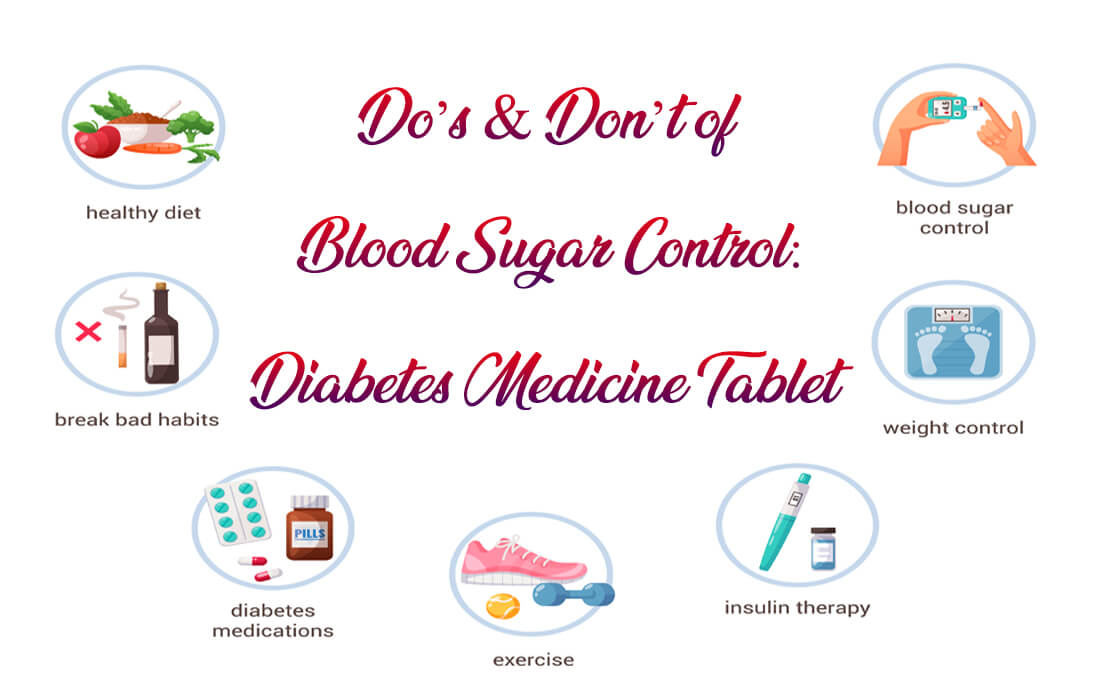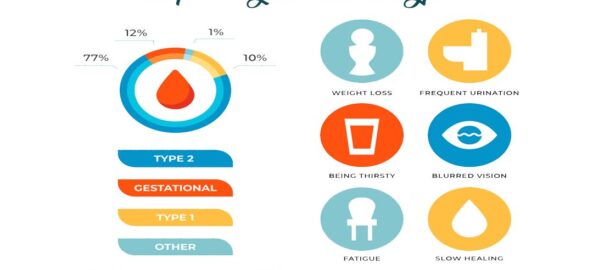
Diabetes is a prevalent and complex chronic medical condition that affects millions of people worldwide. It revolves around the body’s ability to regulate blood sugar (glucose) levels effectively. Proper glucose utilization is vital for overall health as it is the main energy source for our cells. However, in the case of diabetes, this finely tuned balance is disrupted, resulting in increased blood sugar levels, and these can have a significant impact on an individual’s health and overall quality of life. While managing diabetes can be tough, adopting the right knowledge and lifestyle changes paves the way for a wholesome and gratifying life. We will explore the essential dos and don’ts along with diabetes medicine tablet for both types of diabetes, which can help you better understand and manage this condition.
Understanding Diabetes
Diabetes is a persistent health condition marked by an increase in the levels of sugar in the bloodstream. It comes in two primary forms: Type 1 and Type 2. Type 1 diabetes indicates a malfunction of the immune system, where beta cells in the pancreas responsible for insulin production are erroneously identified and eliminated. As a result, individuals with Type 1 diabetes must rely on daily insulin injections or an insulin pump to regulate their blood sugar levels.
Type 2 diabetes is commonly attributed to lifestyle components, such as an unhealthy diet, obesity, and sedentary behaviour. In this type, the body either becomes resistant to insulin or doesn’t produce enough of it. With alterations in lifestyle, and sometimes type 2 diabetes best medicine or insulin therapy, it can be effectively managed. Both types of diabetes require careful monitoring, adherence to a healthy diet, and sustained physical activity to help stabilize blood sugar levels and mitigate the chances of complications.
Do’s for Diabetes
1. Regular Monitoring:
Keep a close eye on your blood sugar levels. Regular monitoring helps you understand how your body responds to different foods, medications, and activities. This information is crucial for making necessary adjustments to your diabetes management plan.
2. Maintain a Balanced Diet:
Focus on a well-balanced diet rich in vegetables, whole grains, lean proteins, and healthy fats. Monitor your carbohydrate intake and try to avoid sugary beverages and processed foods.
3. Portion Control:
Pay attention to portion sizes to prevent overeating. Maintaining stable blood sugar levels is facilitated by consuming smaller and more frequent meals.
4. Regular Exercise:
Engage in regular physical activity, which can significantly impact blood sugar control. Along with an exercise plan that is safe and appropriate, include type 1 diabetes tablets for your condition.
5. Stay Hydrated:
Ensure proper hydration by drinking plenty of water. Dehydration can affect blood sugar levels, so it’s essential to maintain adequate fluid intake.
6. Stress Management:
Find effective techniques for dealing with stress, recognizing its potential to impact blood sugar levels. Techniques such as meditation, deep breathing, or counselling can help you cope with stress.
7. Educate Yourself:
Learn as much as you can about diabetes. Understanding the condition, its symptoms, and its management is empowering and helps you make informed decisions.
Don’ts for Diabetes
1. Avoid Skipping Meals:
Fluctuating blood sugar levels can occur when you skip your meals. When you skip a meal, your body doesn’t receive the necessary fuel (glucose), potentially causing hypoglycemia (low blood sugar) or overcompensation with high-sugar snacks later in the day. Ensure your blood sugar levels remains stable throughout the day by choosing balanced meals and snacks at regular intervals.
2. Limit Sugar Intake:
Minimize your consumption of sugary foods and beverages. These products can induce abrupt increases in blood sugar levels, posing a challenge for control. High sugar intake can also contribute to weight gain and other health issues, so it’s best to avoid or significantly reduce them in your diet.
3. Avoid Excessive Alcohol:
Alcohol can affect blood sugar levels; it may lead to either high or low blood sugar levels, depending on factors like the type of alcohol, how much you consume, and whether you have eaten. If you choose to drink, do so in moderation and always monitor your blood sugar levels carefully.
4. Don’t Smoke:
Smoking is harmful to everyone, but it poses additional risks for individuals with diabetes. The act of smoking can further deteriorate diabetes-related problems, including heart disease and diminished circulation, increasing the risk of significant foot issues. If you smoke, seek support to quit and improve your overall health.
5. Don’t Neglect Foot Care:
Proper foot care is crucial for diabetic people. Increased blood sugar levels may harm nerves and blood vessels, ultimately reducing both foot sensation and circulation. Neglecting foot care can result in serious complications like diabetic foot ulcers or infections. Avoid walking barefoot; inspect your feet daily for any cuts or sores.
6. Don’t Ignore Hygiene:
Diabetes can make you more susceptible to skin problems and infections. Neglecting proper hygiene can lead to skin issues, particularly in areas prone to moisture, such as between the toes. Regular washing and moisturizing are important to prevent skin problems.
7. Avoid Fad Diets:
Steer clear of diets promising rapid weight loss. These diets can be dangerous for people with diabetes and may lead to unstable blood sugar levels. Instead, focus on a balanced and sustainable diet that meets your nutritional needs.
8. Don’t Stress Over Perfection:
It’s normal for blood sugar levels to vary from time to time. Stay composed, and don’t let occasional highs or lows overwhelm you. Focus on daily habits and make necessary adjustments to your diabetes management plan.
9. Avoid Neglecting Sleep:
Adequate sleep is crucial for overall health and can impact blood sugar control. Insufficient sleep may result in insulin resistance and increase the difficulty of regulating blood sugar levels. Aim for quality sleep per night to help maintain stable blood sugar levels.
Conclusion
Managing diabetes, whether it’s Type 1 or Type 2, requires a combination of proactive measures and lifestyle adjustments. By following these dos and don’ts, you can take control of your diabetes and work towards achieving stable blood sugar levels, reducing the risk of complications, and leading a healthier and more fulfilling life. Remember that diabetes management is a journey, and it’s also necessary to take a diabetes medicine tablet to provide support along the way. Don’t hesitate to ask for help and information to make the best choices for your health.










